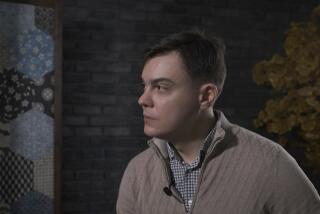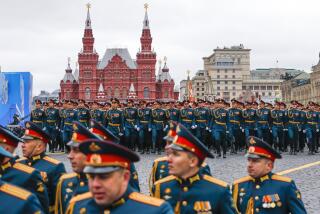Yeltsin Strategist Turns Sights on Buoying Support for Reformers
- Share via
MOSCOW — It’s 1962 and Vyacheslav A. Nikonov is 6 years old. He is hospitalized with a childhood illness, separated from his parents, surrounded by strangers and frightfully worried. About the Cuban missile crisis.
“It was the first thing I asked my father about when he came to pick me up,” the political strategist, now 40, recalls of his early interest in world affairs.
“I had been listening to the radio the whole time I was in the hospital. It seemed only natural to be intensely concerned about this,” he recalls of the superpower crisis. “From as far back as I can remember, the conversation in our home revolved around politics.”
Growing up under the roof of ousted Stalinist Foreign Minister Vyacheslav M. Molotov--the grandfather for whom he was named--left an early and indelible mark on this savvy and ambitious figure whom many see as a rising star in the Kremlin.
With a knowledge of spin-doctoring and image-making, Nikonov was to Yeltsin’s reelection what James Carville was to President Clinton’s 1992 victory. And for his winning strategy Nikonov is rumored to be in line for a senior government appointment.
Having cut his teeth on the tumultuous politics of the 1950s and 1960s, Nikonov saw his career take off early when Soviet leader Mikhail S. Gorbachev tapped him for his reform team in 1989, seeking guidance from the young historian who wrote his doctoral thesis on the U.S. political system.
Gorbachev lost out to Yeltsin two years later, though, prompting Nikonov to switch allegiance and back Yeltsin.
Nikonov takes responsibility for a failed bid to foster a two-party system in Russia last year, when electoral blocs created ahead of December parliamentary elections were so internally riven that they failed to inspire voters.
But colleagues in the still-functioning campaign team behind Yeltsin credit Nikonov with charting a turnaround in the president’s popularity ratings.
The strategist may face an even more daunting challenge with his newest assignment--to galvanize support for democratic figures running in 50 gubernatorial races this year.
“We are not in any shape to win the next Duma [lower house of parliament],” Nikonov says of the opposition that reformers face from the Communist Party. “We need to get our people in the governorships and, even more important, in the regional legislatures.”
While unabashedly ambitious himself, Nikonov says he will wait to make any big move until after the current power struggle to succeed Yeltsin is over.
“The only thing I know for sure,” he says, “is that I’m not going to run for the presidency until the year 2008.”
Yeltsin won a four-year tenure earlier this month, but the 65-year-old leader has been far from the public spotlight amid rumors that he has suffered another bout of heart trouble.
Nikonov regards Yeltsin as “masterful” for creating three separate power bases--a nationalist faction led by Security Council chief Alexander I. Lebed, a moderate government force headed by Prime Minister Viktor S. Chernomyrdin and a liberal policy team under new chief of staff Anatoly B. Chubais.
“Both Lebed and Chernomyrdin have strong presidential ambitions, and in between them is Chubais, who will create a very strong presence and balance,” Nikonov says, dismissing Chubais, for now, as a viable contender.
He gives the advantage to Lebed, whom he describes as “an empty glass” that can be as easily filled with democratic virtues as with the nationalist rhetoric he has lately been spouting.
By prepping three understudies, the strategist insists, Yeltsin has positioned candidates who can appeal to whatever political sentiment prevails in Russia when power must pass to new hands.
More to Read
Sign up for Essential California
The most important California stories and recommendations in your inbox every morning.
You may occasionally receive promotional content from the Los Angeles Times.














